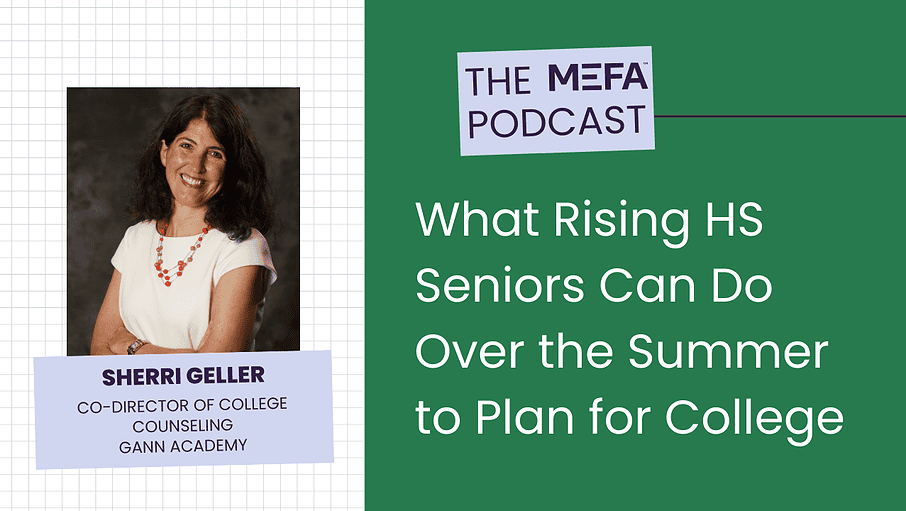

Resources Mentioned in this Episode
Please note that this transcript was auto-generated. We apologize for any minor errors in spelling or grammar.
Jonathan Hughes: Hi everyone, and welcome to the MEFA Podcast my name is Jonathan Hughes. And I’m here all by myself this week. I’m not joined by Julie Shields-Rutyna. She’ll be back on the next episode. This is going to be a shorter episode, a little bit of a special episode of the show, and a few short moments where you’re going to be speaking with Sherri Geller, who is the co-director of college counseling at Gann Academy in Waltham.
And we had a great discussion about what, I guess you’d call ‘them rising Seniors, juniors who are gonna be applying to college in the Fall, you know, in their senior year. Some things that they can do over the Summer to make life a little bit easier for them in the Fall. So if you have a Junior in high school right now who wants to go to college [00:01:00] you’ll definitely want to hear this conversation.
We talk about a lot of really great and useful things, but first I want to take a question from the MEFA mailbag, and these are questions that have come in to us from customers over the past few weeks and answered by our college guidance experts. So remember, as always, if you have any questions, you can reach out to us at [email protected]. You can call us at 800-449-MEFA and you can reach us over social media on Facebook, @MEFAMa, on Twitter at @MEFATweets, and on Instagram @MEFA_MA. This week’s question comes to us from Christopher, who writes, I read on your blog that the MEFA loans are annual, not for the entire tuition amount, so when we apply, it will be for one year’s tuition and will we reapply the following year?
Also, are repayments due upon funding or can they be deferred until [00:02:00] graduation or beyond? Okay. So a few questions here, and I wanted to add this question because. Our interviews segment is going to be all tailored to juniors. This is for folks who are heading to college either in their freshman year or as Christopher is in a later year.
And it’s true that MEFA loans, as I think pretty much all educational loans are dispersed to the college on a yearly basis. So colleges really can’t hold on to money. Throughout the years that a student is going to be enrolled, they have to pay an outstanding bill with the money that they receive.
And so typically people do apply for the full academic year, whether that’s August or September through, through May, or what have you. Sometimes people do apply per semester. But typically they do it per year and colleges often elect to be paid by semester. So you [00:03:00] know, you have to put, when you’re putting in the application the loan period, when do you want this loan to cover?
So, as I said, if this was the full academic year, you might say this is going to be for August of 2023 through May of 2024, and you would ask for the amount that you needed or that you estimate that you need for that, that period. That gets sent to a college, assuming that you’re approved, that that record gets sent to a college and they say, yes, this student is enrolled at this college.
They can have this amount of money. And then they also tell us when and how often to pay them. So, as I said, typically it’s per semester. So they might say, give me half of that money in August and give us the, the second half in January. Again, whenever their bills have to be paid. So that’s how they elect to do it.
And then the following year, I can speak for MEFA on this point, it’s the same process, so you’d have to reapply. There’s another credit check. You know, [00:04:00] rates are often different from year to year. And amounts may differ from year to year. So it’s the same process pretty much all over again. Now, as to the question of whether or not you begin to repay after the, the loan has been sent to the college, or can you defer until after graduation?
That depends. We have different loans. So some of our loans, you begin repayment after the loan has completely dispersed to the college, or you can have a deferred loan. Where the repayment is not expected to begin until six months after the student graduates leaves school, or drops below halftime at the program.
Once that happens, the student will enter a six-month grace period, and after that grace period repayment begins. So it really depends on, on the option that you are approved for and that you select. So that is the answer to that question. Remember, if you have any further questions, you can reach out to us.
Our email is [00:05:00] [email protected], phone number 800-449-MEFA. And again, our social media information is Facebook is @MEFAMa, our Twitter is @MEFATweets and our Instagram is @MEFA_MA. We have a bench of college guidance experts, waiting to answer your question. Now, let’s talk about this summer with Gann Academy’s, director of College Counseling Sherri Geller.
Our guest today is Sherri Geller. Since 2010, Sherry has worked as the Co-Director of College Counseling at Gann Academy in Waltham, Massachusetts. She also worked for 12 years in the admissions office at Brandeis and Northeastern University and has been the president of the New England Association for College Admissions Counseling or NACAC, and served on the board of Directors of the National Association of College Admission Counseling NACAC, which is where we met.
She’s also a veteran podcast guest as well. I [00:06:00] think this is your third podcast that you’re being on. So we’re very excited to have Sherri Geller. Welcome to the show.
Sherri Geller: Of course.
Jonathan Hughes: And so today we’re going to talk about how students can use their time this summer to prepare themselves for the fall for their college search and their application process. So let’s just set this up. What grade levels specifically are we addressing here?
Sherri Geller: This is really for juniors that will be rising seniors.
Jonathan Hughes: And so thinking about these juniors who have their busy sort of fall senior year ahead of them, what’s the number one thing that they could do this summer to make their lives easier in the fall?
Sherri Geller: I think the number one thing is to write a draft of their main common application essay, and students can go even now to commonapp.org just as, oh, it sounds C O M M O N A P P for application .org.
And see what the prompts are and start to prepare them. If writing an essay feels daunting. Another high item number one thing a student could do is just set up their Common App account and start to fill in some of the easier parts of the static parts that won’t change. So for example, putting in where they go to high school, putting in what their parent or guardian’s names are.
Things that are just basic information that will take some pressure off in the fall, but I’m happy to talk a little bit more about either of those. But those are my top two.
Jonathan Hughes: Yeah. So let’s talk about the Common App a little bit more. Do you think that These juniors because I, you know, this is something I don’t know, and I, are they familiar with the Common App already?
Sherri Geller: I think in many high schools; the counseling staff introduces the Common App to Juniors. But if not, or if you’re a parent listening to this, they’re not familiar. The Common Application is just like what? It sounds like it’s a common [00:08:00] application that students can use to apply to literally hundreds of different students.
Schools, hopefully they won’t be applying to hundreds, but it’s the same application. So the common app has some information that’s common. Things like I mentioned, like just general background information, family information, where a student went to school. There’s one main essay that is the same essay for all of the schools.
And then other things like filling out a list of activities or how a student spends. Their time are all things that every school asks for. If they’re part of the common application, then schools are allowed to have separate sections that are their own questions that are called supplemental questions.
Some of those are very straightforward and easy, like do you think you want to live on campus? Has anyone in your family applied to this school? Things that are just sort of checking click boxes and are very quick and easy. Others are, Longer things like they might have an essay or what they call a short answer, but it’s really a short essay.
Something like, why do you want to go to this particular college? So [00:09:00] it’s personalized. Or maybe why do you want to study in this particular subject, this major at this particular college? So those can take a little bit more thought because they’re school specific, but I recommend starting with the main common application that you would send to any school before diving into those supplemental questions.
Jonathan Hughes: And so these are things that you can do before you actually have to list colleges that you’re sending this common application to?
Sherri Geller: That’s correct. You just set up an account, like I said, at common app.org, log in and start to fill it in. It’s very straightforward. There’s a tab called My Colleges where you can start to add colleges, and if you add a college because you want to see what their supplemental questions are, and then you change your mind, it’s very easy to also delete that school.
You’re not making any commitment. You’re not signing up for anything. It’s just a way to store and record the list of schools that you’ll be applying to. There is a place also when you pick a school that you can give access to a [00:10:00] school to know that you’ve chosen them. So if you’d like to get on that school’s mailing list or to hear from them, you can.
Get some information and feedback by doing that, but I recommend just starting with the main parts of the application and doing that. The common application has been around for decades already. It used to be a fairly small limited group of schools, but now there were literally hundreds as more and more colleges every year decide to adopt this format.
The idea was that. Instead of students spending a lot of time refilling out the same information over and over and over again, that the information that all the schools wanted would be common. And so students can spend more time working on it once and getting it in a format, in a style that they’d like it to be.
And then if the schools have their own separate questions, they make it fairly straightforward to fill those out Also.
Jonathan Hughes: You did mention the essay earlier and so, and, and the prompts, and I want to talk about the prompts a little bit. Can you describe what you mean by that?
Sherri Geller: Yeah, the Common [00:11:00] Application has six prompts and they also have one called topic of your choice that I’ll talk about in a minute.
But the prompts give some flexibility to students while also giving them some guidance at the same time. So for example, there’s one that says, the lessons we take from obstacles we encounter can be fundamental to later success. That’s the setup. The part of the essay is recount a time when you faced a challenge, setback, or failure.
How did it affect you and what can you learn from the experience? So if you choose that prompt, which is one that a lot of high school students relate to, they’ve kind of set it up for you in terms of having a beginning, middle, and an end. What was the challenge? How did it affect you, and what did you learn?
So that’s something I like about using. One of the main six prompts is that each one of them gives you some structure. There is one, share an essay on any topic of your choice. But what I find with that one sometimes is that you don’t actually get to a topic. Students kind of write things that [00:12:00] doesn’t have always as good a structure as if you follow the prompts that are there.
So within each prompt, there’s a lot, of flexibility about what actual topic you could use, but I recommend taking the big topic and then fitting it into one of these questions. The other prompts are all things that most high school students could write right now if they wanted to, if they sat down and thought about it.
There’s one about background and identity that many students will relate to. There’s one that I like that’s a fairly new question. Reflect on something that someone has done for you that has made you happy or thankful in a surprising way. How has that gratitude affected or motivated you? Another one is about accomplishments that sparked personal growth and topics that you find so engaging that you lose all track of time.
So the prompts can be kind of fun to think about. And then using things that you learn in high school, like having a beginning, middle, and an end to it. As I [00:13:00] mentioned, using good grammar and not just. Spell checking, but actually proofreading. Thinking about what’s the point of the essay, what do you want the reader to learn about you?
You know, applications are filled with things that are already preset where you don’t have a lot of control anymore. Like what’s your list of activities? Well, by the time you’re going to be a senior, most of that is set. Most colleges ask for teacher recommendations, and while you may choose the teachers, you don’t have control over exactly what they write.
If you take a standardized test, you may have a little bit of control in studying, but you don’t have real control over what your score is going to be. But the essay is a place where you have so much control. You start with a blank piece of paper or blank computer screen and can model all of your ideas to share with a college admissions office.
So I think over the summer when students have a little bit more time to think and to breathe and to spit something out, to just get going, working on an essay can. Really, really be [00:14:00] helpful. Even if it’s not perfect and you want to get some feedback from someone at school in the fall or have someone proofread it for you.
If you get that main first draft written, it can really, really help with your stress level in the fall.
Jonathan Hughes: Yeah, I think that’s a, that’s a great idea. I know that essays are, one of the things that causes the most stress for students, because they’re not sure what they should write about. And I don’t know if you-
Sherri Geller: I have another tip related that, that I think is surprising to students. I don’t know if it’s a tip or just a something to know. I think sometimes students treat this essay like they’re writing their first novel and actually, the limit and it does cut you off, is only 650 words. So it’s a minimum of 250, which is a paragraph. 650 words is only about a page and a half, and most high school juniors have written things that are significantly longer.
So I think sometimes the harder part is keeping it to only 650 words, rather than saying, do I have enough to write about? Because students [00:15:00] have lots and lots of things that can make compelling essays and the topic doesn’t have to be so brilliant. I’ve read essays over time that I’ve loved about going on a rollercoaster ride and writing about an aspect of taking a risk meeting a famous person.
That has left with some message that’s been important to them, like topics that don’t seem to be so grandiose but actually have had really important and meaningful lessons to the student or takeaways that they want to share with the admissions office. As the people reading the applications, get to know them.
Jonathan Hughes: We typically recommend that students ask their teachers for letters of recommendation by the end of their Junior year. So, you know, some students may have time, but we’ll be posting this episode probably after most students have left for the summer. So if there are some students who are hearing this and their Junior year has passed and they haven’t asked the teacher for a letter of recommendation, is that okay?
Sherri Geller: Absolutely. There’s still plenty of time. Some teachers will [00:16:00] answer an email over the summer, although it’s really a nice courtesy to ask someone in person. Recommendations are almost like writing an essay. A teacher’s going to spend some time thinking about you developing a piece of writing that has a beginning, middle, and an end that shares some of your best qualities about you as a student.
If you ask in the fall. Maybe it will be a teacher that you already had, or maybe you’ll wait a little while into the school year to see how a particular class is going. Many colleges ask for one teacher recommendations, but there are a group that asks for two. So if you’re asking for two recommendations, you might think about asking teachers in different kinds of subjects.
So maybe like science and history or math and English, things that are kind of different from each other. So the colleges can learn about you as a student in different ways since in those classes, one may focus more on writing, another may focus more on group work. In one, you may be a great active participant, and in the other you may be really well known for [00:17:00] Sharing your own personal background as it becomes relevant as part of a discussion, things like that.
So thinking about who the right mix is for teachers can be helpful, but the recommendations won’t be due until whatever your college earliest college deadline is. So that may be usually not earlier than November 1st, or there are a few exceptions, but it may be November 1st, November 15th, December 1st, or all the way until January or February, depending on what your college list looks like.
Jonathan Hughes: Should you ask a teacher to stress any particular aspect in their recommendation?
Sherri Geller: Yes. Sure that it’s, it kind of depends on your relationship with the teacher and what would be helpful to the teacher. So some teachers at the school I work at, like to ask that direct question of students is, is there something from your class that really excited you, a unit that was really intriguing to you or something in that class that you were really proud of?
Most teachers will have a sense of what to write and the fact that you’ve asked your one, that one teacher, out [00:18:00] of all the teachers that you’ve had Says something about how you’ve done in that class. But if there is something, it’s absolutely fine to say to a teacher. Thank you so much for writing a recommendation for me.
You know, one reason that I asked you to write is that I really worked hard on developing my writing this year, and I’m proud of how far I’ve come. So I hope you can let the colleges know what a strong writer I am now after taking your class and spending so much time working on my writing, for example.
Jonathan Hughes: You know, one of the first things that I thought of when we were discussing this topic was college visits. Can you talk a little bit about why college visits are useful? And then over the summer, of course there are fewer students, fewer classes going on there. Is it a good, is it still worth it to visit?
Sherri Geller: Sure. Just like visiting anywhere, maybe you have in your mind what a particular, even something local like what a museum is going to be like, what a certain beach is going to look like. Something that’s just around the corner. And then you get there and you’re like, [00:19:00] “oh,” and maybe that’s a good “oh” that you’re all excited.
Or maybe you say, well, this wasn’t what I thought. I don’t want to stay here. So that’s of course a reason to visit colleges and to try to picture yourself as part of a community and as part of a learning environment that will feel most right to you. Talk to the people that are there, see what the buildings look like.
Get a sense of how urban is this campus or not. How large is this campus? What does the campus generally feel like as you’re walking across it? Is it really spread out or is it more compact? If it is in a city, does it still have a campus with some grass and trees, or is it all buildings that you can’t tell the difference between?
A city building and a university building, things like that. Seeing in person can be so helpful if you’re thinking about schools that are not nearby and you’re not able to get to those schools. You can also see some schools that are local that to whatever area you live in that that are similar. So seeing a school in a city, we’re taping this from Boston, [00:20:00] so seeing a school in Boston might give you some good ideas about what it might feel like if you were in New York or DC or Philadelphia.
Seeing a school in a more remote area of Massachusetts could give you a sense of what it feels like in a more remote area of other states. So that can be really, really helpful. As far as the summer goes, it’s obviously ideal to see schools when they’re fully in session, but I also think that there’s a lot of things over the summer that can be super helpful.
One is that the look of the buildings doesn’t change whether a school is in a city or not, or how far from a city doesn’t change how long it does take to walk from one place to another. From where the residence halls are to the cafeteria. No different, whether you’re in the summer or fall, what majors they offer, how many students go there, where students are coming from.
None of those things change. If the look of buildings is important to you, you want a certain architectural style, a more modern campus or not, those things don’t change. So the one [00:21:00] thing that does change is seeing the school live in action. Being able to sit in on classes, perhaps talk to kids that go there.
But if you can use your imagination a little bit, I think seeing those other things over the summer is very, very valuable. Another valuable aspect of visits that has been a positive outgrowth of the pandemic is how much more robust and helpful virtual visits convey. So many colleges now have half hour information sessions that are interactive online sessions.
They may be a Zoom, they may be sort of a webinar, but with a. Interactive question and, and answer format so that you can learn a lot about a campus and a half hour from home in an interactive space, and that may help decide if you want to do further research or further. Visiting and people used to kind of roll their eyes at, oh yeah, I can look at the website.
But now having these much more robust virtual visits and online virtual tours can really be a very helpful way if you’re unable to visit or trying to plan a trip further [00:22:00] away and narrow down the list of schools that you might want to see in person.
Jonathan Hughes: So funny you mentioned the architecture. I spoke with a student on, on the show actually about her visit. And one of the things that played a really important role in whether or not she liked a college or not was the walls. She didn’t like the way the walls were and the inside, and it made her feel like she was in a gym and she didn’t like it. So yeah, those things that you, you know, are, don’t change, but also you don’t know until you step on.
The campus can, can play a big, big role. You know, we talk to a lot of parents and families in particular at MEFA. So we always like to sort of think about what parents can do to help their students. What are some things that parents can do this summer?
Sherri Geller: Well, directly related to what we’re saying about visiting, I think where parents can be a huge help is with visit planning. Even if it’s just a road trip helping your student organized, what days are we going to go? How much time is it going to take to [00:23:00] get there? If you need to book hotel rooms or flights, or bus reservations, train reservations parents can really help with that.
Another big suggestion I’d have, whether it’s about that or anything else, is parents asking your kids. How can I help? Because that gives the student autonomy. It helps the student feel more independent and have ownership of the process and while knowing that their parent is there to help them. So instead of saying to a student Hey, why don’t you work on your essay today?
Perhaps you have the conversation of, Hey, why don’t we think about this summer and what are some of the things you’d like to accomplish this summer? And if they really don’t want to work on an essay yet, there are many, many other things that they could work on. Over the course of the time. Another thing that parents can do is start to learn about financial aid and taking a look at the many websites, including MEFA, the host of this podcast, that have information on what documents you’ll need to fill out the FAFSA, or if a school requires that the CSS Profile®, gathering those documents during the summer when [00:24:00] there’s low stress and maybe a little bit more time and you’re not under deadline, will be a really good step to make things easier.
In the fall and winter when it’s time to fill out the more official paperwork. Other things parents can do for their kids is offer to help brainstorm an essay. If a student needs to register for standardized testing in the fall, the registration time will happen in the summer for the fall, so parents might keep on top of those deadlines.
Maybe we’ll even do the registration for their kids after asking them if that would be helpful. But it’s really a family decision of what role does everyone want to play? Some students want to be, the phrase we use at my school is the captain of the ship, where the student really takes ownership and leads the way and fills in the cap.
The first mate parent, so to speak as they go along. In other families, the parent is more the captain and the student’s kind of being tugged along. So thinking about what that family dynamic is and what the student wants it to be can also be a really hard, interesting and helpful [00:25:00] conversation as you lead into the summer so everyone isn’t tripping over each other. And then getting into maybe some arguments over who’s taking care of what in the college application process.
Jonathan Hughes: Well, speaking of that, you know, one of the things that I always think about in terms of admissions, and you can tell me if this is true or not, so I’m going to ask you true or not is that the student should be seen by the colleges to be the one to be reaching out on admissions matters.
Sherri Geller: Yes, absolutely. Students should put their names on college contact lists if they’re interested in getting materials. If you as a parent want to watch one of the virtual sessions that I mentioned, you should be registering though your student to do it. Some schools do ask, are you a student or a parent? And of course if you’re filling out a form that it asks if you’re a student or a parent and you’re filling it out as a parent, it’s fine to check. Yes. It means that the college does want to have that information and may want to engage with you or sending. Send materials to you that would be relevant for their parent [00:26:00] community.
But walking into a school, you might think about your sons and daughters as being the ones that are going to go to college. So instead of saying, oh, we are here for the tour, trying to have your student. Go in and introduce themselves and take the lead on that. I recognize that some kids feel braver than others.
Some are shyer or more outgoing than others, but it’s a good step toward the independence that they’ll need to exhibit once they’re in college to be able to walk in, introduce themselves and see what the next steps are when they arrive for that visit. So, the same thing with filling out applications.
In my mind, parents should never touch the application. It could be that students ask their parents advice; they will want to know if the parents went to college. The application asks what years they visited. So parents will have a very active role, but in my mind, the students should be doing all of the actual filling out of the.
I call it paperwork still, but of the websites and of the of whatever materials are going to be sent to the college, the student should be doing the work, [00:27:00] even if the parent is behind the scenes as a great support resource helper, assistant and whatever, you know, helping the student along with whatever questions they have.
Jonathan Hughes: Sherri, is there anything else, any final pieces of advice, anything we haven’t talked about yet that you’d like to say before we go?
Sherri Geller: One more since this is really about using the summer wisely. And that’s to allow summer to also be summer and take the breaks that you want. Go for ice cream, go to the beach, let college go. There’ll be plenty of time to work on everything in the fall. So all of this advice is about ways you can take the edge off of your fall that make things a little less stressful. Get some things out of the way before you kick into gear with senior classes and also the fun social things that happen senior year.
But it’s also okay to not be constantly in college mode because that can be not only really exhausting, but really add to your stress and you want your summer to be a time that you can let. A lot of that stress and anxiety go so relatedly as a family Jonathan, you asked about parent role as a family.
You [00:28:00] might agree that, you know what, we’re only going to talk about college over Sunday nights at dinner, and the rest of the week we’re going to do our thing. And if you’ve agreed that over the course of the week the student’s going to set up their common application account, for example, then by that next Sunday at dinner when there’s a check-in, students should uphold their end of the bargain.
But rather than every time you get in the car, every time, Things are quiet and you have a chance to talk. It’s college, college, college. All that does is really stress everybody out. So I would say enjoy the summer. Summer jobs. Summer experiences can lead to great essays if students have interviews.
There can be some great stories from fun things that happen over the summer, so enjoy the summer. But yeah, maybe get a little bit of work done so that you can enjoy your fall too as you get back to school and have a great senior year.
Jonathan Hughes: Well, that’s a good note to end on. Sherry, thank you so much.
Sherri Geller: You’re welcome, Jonathan. Thanks again for inviting me to be on your show.
Jonathan Hughes: All right folks. Well, that about wraps it up for us this week. Once again, I want to thank Sherri Geller for being here. That [00:29:00] was a great conversation and I hope you enjoyed it. And folks, if you liked what you heard today and you wanted to know more about planning, saving, and paying for college and career readiness, well then you can follow the show at Apple Podcast, Spotify, Stitcher, wherever you get your shows from.
And please remember to review us. It helps us to keep doing what we’re doing and getting this show out in front of people like you. So once again, Julie will be back next time. I want to thank Shaun Connolly, our producer. I want to thank AJ Yee and Lauren Danz for their assistance in helping us to post the show.
Once again, my name is Jonathan Hughes and this has been the MEFA Podcast.












